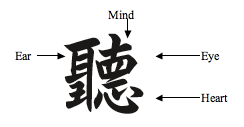![[Home]](../GIFs/LatestEofEHead.gif) |
•
Speaker • Trainer • Consultant • Coach • Facilitator • Emcee • Storyteller |
||||
HUH?
Listening Not Just for the Faint of Hearing
By Craig Harrison
Three elderly men were walking down the sidewalk, seemingly in conversation.
The first proclaimed: “Windy, isn’t it?”
To which the second man loudly disagreed: “No, it’s Thursday!”
To which the third senior citizen concurred: “Me too. Let’s get some coffee!”
Apocryphal though this story may be, these grandfathers have an excuse. They are hard of hearing. What’s our excuse? Are we tired of hearing? Not listening? Or only partially listening?
Listening is the forgotten communication skill. It helps you understand others, solve problems, convey respect, build consensus and so much more. And in sales situations, listening uncovers needs, helps you hear objections and thus allows you to sell more.
Poor listening costs money, wastes time, breeds misunderstanding and generally leads to less sales and loss of clients. Do I have your attention yet?
Levels of Listening
At any given time we are partially listening to other people we’re in conversation with. In our defense, there are distractions of all sorts: auditory, visual, olfactory and more. There’s ambient noise. There are interruptions. Distractions may come from other people, from cell phones and pagers, and from our own noisy mind.
At a basic level, are you hearing everything being said by the speaker, whether he or she is your conversational partner, or a client, customer or colleague speaking to you?
More than just hearing their words, are you gleaning the meaning of their sentences?
And then, there’s the deeper meaning. Can you listen between the words and sentences for the implied meaning? What is the tenor of the words being spoken? There are often meta-messages embedded in the words being spoken. Not everything that is spoken should be taken at face value.
The basic speaking-listening conundrum
By now you’ve probably heard that we speak at but 200-300 words per minute, but can listen to far more words per minute. The result: as listeners our minds wander as we wait for the speaker to finish expressing his or her thoughts. What’s a listener to do while waiting for the speaker to complete his or her statements? We let our minds wander, we think of what to say next, we ponder our next meal or allow ourselves to become distracted by the scenery, or retreat to the caverns of our own mind. It’s natural.
Painful to Listen To
Add to that the reality that many conversational partners have issues. Some are:
The net effect: listeners tune out. For others, they’re honorary members of The Four Tops…they’re always singing the same old song!
Active Listening Builds Trust
One way to avoid losing interest or getting distracted while listening is to engage in active listening. Less passive than simply absorbing what is being spoken, an active listener uses ears, eyes, body and mind to engage their conversational partner.
As a person is speaking to you give them eye contact. If you understand what they are saying, you can nod periodically to indicate accord. You can also smile in a show of recognition. Should you become confused by what they’re saying, you can furrow your brow, or tilt your head to indicate, non-verbally, your uncertainty about what they’re saying. In these ways you are listening more actively.
Chinese Wisdom: ListenTING
The Chinese character TING that forms the verb “to listen” includes the characters for Ear, Eye, Mind and Heart. This reflects the reality that, to truly listen, one must involve more than just one’s ears. It’s a whole-body experience!

Take the Listening Challenge
Vow to be a better listener! Concentrate on listening, whether with co-workers, family members or strangers. When you find yourself distracted, take note that you are, and then refocus on the speaker you’re listening to.
When the discussion gets heated or overly complicated, use your ability to paraphrase and summarize what you’re hearing to conform your understanding of what you just heard.
The good news: over time, your concentration will improve. Practice your listening skills when at lectures, listening to sermons, hearing radio and TV interviews and even at the dinner table.
You will find that the better you listen to others the more you engender their trust. The result: a stronger your relationship that in turn fosters more sales. Hears to hearing, and listening better too!
|